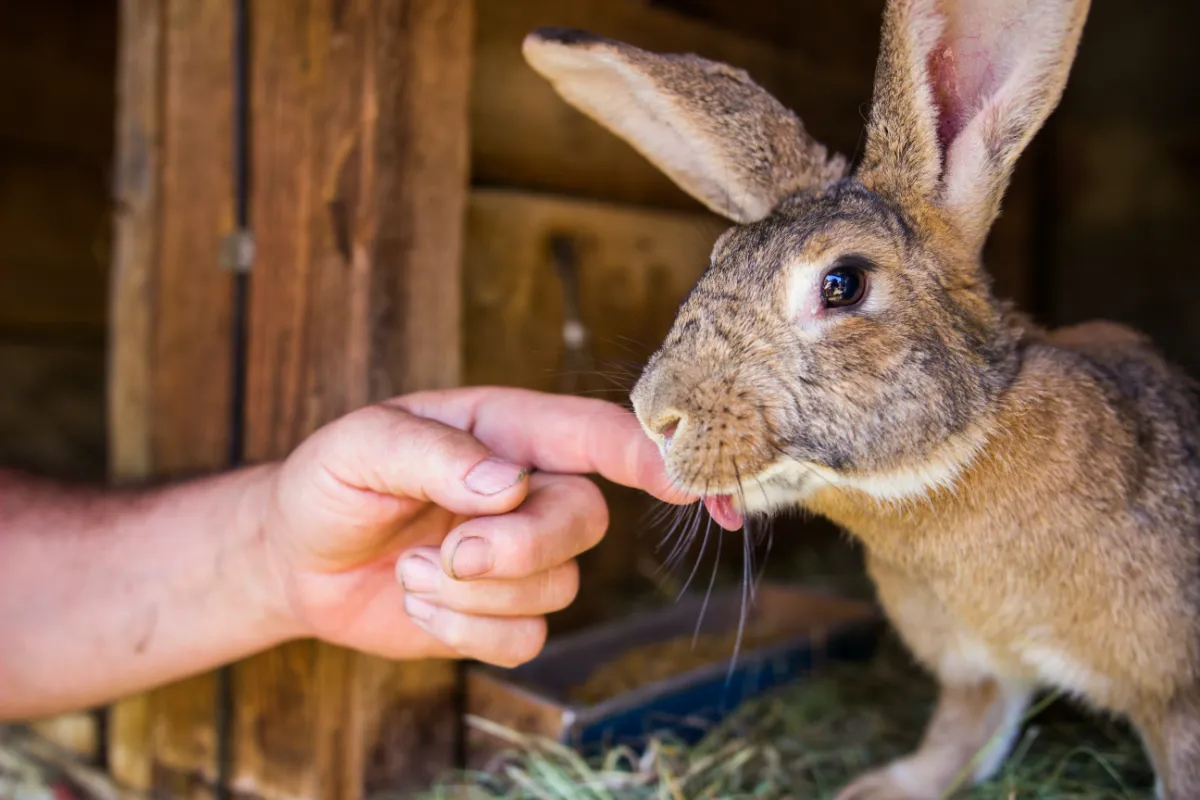Did you know that rabbits have the ability to delay giving birth? In fact, it is a fascinating phenomenon that occurs in certain circumstances. Understanding the factors that affect the gestation period of rabbits and the reasons behind delayed birth can provide valuable insights into their reproductive behavior.
This article explores the research on delayed birth in rabbits, the role of hormones in their reproduction, and the implications of this intriguing phenomenon. Get ready to delve into the captivating world of rabbit reproduction and discover their astonishing abilities.
In This Article
- 1 Key Takeaways
- 2 Factors Affecting Rabbit Gestation Period
- 3 Research on Delayed Birth in Rabbits
- 4 Possible Reasons for Delayed Birth in Rabbits
- 5 The Role of Hormones in Rabbit Reproduction
- 6 Understanding the Implications of Delayed Birth in Rabbits
- 7 Frequently Asked Questions
- 7.1 Can Rabbits Delay Birth Due to Environmental Factors?
- 7.2 What Are the Signs That a Rabbit Might Be Experiencing a Delayed Birth?
- 7.3 Are There Any Specific Breeds of Rabbits That Are More Prone to Delayed Birth?
- 7.4 Can Stress or Anxiety Affect a Rabbit’s Gestation Period and Lead to Delayed Birth?
- 7.5 Are There Any Medical Interventions Available to Help Rabbits With Delayed Birth?
- 8 Conclusion
Key Takeaways
- Environmental influences such as temperature, diet, and stress levels can affect the gestation period of rabbits.
- Genetic factors play a role in determining the length of the gestation period in different rabbit breeds.
- Hormonal imbalances, particularly in progesterone and oxytocin levels, can lead to delayed labor in rabbits.
- Stress and inadequate nesting materials can disrupt the natural birthing process, causing delays in birth.
Factors Affecting Rabbit Gestation Period
You should consider the factors that affect a rabbit’s gestation period.
The duration of a rabbit’s pregnancy is influenced by both environmental and genetic factors.
Environmental influences can include factors such as temperature, diet, and stress levels. Rabbits are sensitive to changes in their environment, and these changes can impact their reproductive processes. For example, extreme temperatures can cause delayed birth or even termination of the pregnancy.
On the other hand, genetic factors also play a significant role in determining the length of a rabbit’s gestation period. Certain breeds may have shorter or longer pregnancy durations due to their genetic makeup.
Research on Delayed Birth in Rabbits
Have researchers discovered why delayed birth occurs in rabbits, or are they still studying this phenomenon? While extensive research has been conducted on the topic, the exact causes of delayed birth in rabbits aren’t yet fully understood. However, scientists have identified several factors that may contribute to this phenomenon.
- Hormonal imbalance: Fluctuations in hormone levels during gestation can affect the timing of birth in rabbits. Imbalances in progesterone and oxytocin, for example, may lead to delayed labor.
- Stress and environmental factors: High levels of stress, inadequate nesting materials, or changes in the rabbit’s environment can disrupt the natural birthing process, causing delays.
- Genetic predisposition: Some rabbits may have a genetic predisposition to delayed birth, which can be passed down through generations.
To manage delayed birth in rabbits, it’s important to ensure a stress-free and comfortable environment, provide proper nesting materials, and closely monitor hormone levels during gestation. Consulting with a veterinarian can help develop effective management strategies tailored to individual rabbits.
Possible Reasons for Delayed Birth in Rabbits
Researchers have identified hormonal imbalances and stress as possible reasons for delayed birth in rabbits. When a rabbit experiences hormonal imbalances, it can disrupt the natural process of birth and cause a delay. Hormones such as progesterone and oxytocin play crucial roles in initiating and regulating labor in rabbits. Any imbalance in these hormones can lead to complications, resulting in a delayed birth.
Stress is another factor that can contribute to delayed birth in rabbits. When rabbits are exposed to chronic stress, it can negatively impact their reproductive system. Stress hormones, such as cortisol, can interfere with the release of important reproductive hormones, leading to delays in labor.
The causes of delayed birth in rabbits can have serious consequences. It can increase the risk of complications during labor, such as dystocia, which can be life-threatening for both the mother and the offspring. Delayed birth can also result in malnourished or underdeveloped kits, making them more vulnerable to health issues.
Understanding the causes and consequences of delayed birth in rabbits is essential for providing appropriate care and intervention. By addressing hormonal imbalances and minimizing stress, we can help prevent and manage delayed birth in rabbits, ensuring the health and well-being of both the mother and her offspring.
The Role of Hormones in Rabbit Reproduction
Understanding the role of hormones in rabbit reproduction is crucial for managing and preventing complications during labor. Hormonal regulation plays a vital role in the reproductive cycle of rabbits.
Here are three key ways hormones impact rabbit reproduction:
- Ovulation: Hormones such as follicle-stimulating hormone (FSH) and luteinizing hormone (LH) are responsible for stimulating the release of eggs from the ovaries. This process, known as ovulation, is essential for successful reproduction in rabbits.
- Implantation: After fertilization, the hormone progesterone helps prepare the uterus for implantation of the embryo. It promotes the growth of blood vessels and the thickening of the uterine lining, ensuring a suitable environment for the developing embryo.
- Parturition: Towards the end of the reproductive cycle, hormonal changes trigger labor and the birth of the offspring. The hormone oxytocin plays a crucial role in stimulating uterine contractions, helping to expel the kits from the mother’s body.
Understanding the Implications of Delayed Birth in Rabbits
You should consider the potential consequences of a delayed birth in rabbits, as it can have significant implications for the health and survival of both the mother and her offspring. Delayed birth, also known as dystocia, occurs when the birthing process takes longer than expected or when the mother is unable to deliver the kits. This can lead to various complications, such as fetal distress, stillbirths, and maternal exhaustion. To minimize these risks, effective management strategies are essential.
| Consequences of Delayed Birth | Management Strategies | Benefits |
|---|---|---|
| Increased risk of fetal distress | Providing a stress-free environment for the mother | Improved survival rates for the kits |
| Higher chance of stillbirths | Regular monitoring of the mother during pregnancy | Reduced maternal mortality rates |
| Maternal exhaustion and complications | Prompt intervention by a veterinarian | Enhanced overall health of the mother |
Frequently Asked Questions
Can Rabbits Delay Birth Due to Environmental Factors?
Rabbits delay birth due to environmental factors. Temperature affects rabbit gestation while nutrition impacts delayed births. Understand how these factors influence rabbits’ ability to delay birth and provide appropriate care.
What Are the Signs That a Rabbit Might Be Experiencing a Delayed Birth?
If your rabbit is experiencing a delayed birth, there are signs to watch for. Common causes include stress, poor nutrition, and genetic factors. To manage a delayed birth, consult a veterinarian for guidance on proper care and assistance.
Are There Any Specific Breeds of Rabbits That Are More Prone to Delayed Birth?
Some rabbit breeds may have a higher risk of delayed birth due to certain genetic factors. It is important to research and consult with a veterinarian to understand the specific risks associated with different breeds.
Can Stress or Anxiety Affect a Rabbit’s Gestation Period and Lead to Delayed Birth?
Stress and anxiety can indeed have an effect on a rabbit’s gestation period, potentially leading to delayed birth. These factors can disrupt the rabbit’s reproductive cycle and impact their fertility.
Are There Any Medical Interventions Available to Help Rabbits With Delayed Birth?
Medical interventions for delayed rabbit birth may include oxytocin administration or manual assistance by a veterinarian. Causes of delayed birth in rabbits can range from stress, improper nesting conditions, to underlying health issues.
Conclusion
Based on extensive research on rabbit reproduction, it’s evident that rabbits have the ability to delay birth under certain conditions. This fascinating phenomenon is influenced by various factors, including environmental stressors and hormonal changes.
Astonishingly, studies have shown that up to 20% of rabbit pregnancies can be delayed, highlighting the remarkable adaptability of these animals. Understanding the implications of delayed birth in rabbits is crucial for ensuring their well-being and successful breeding programs.





